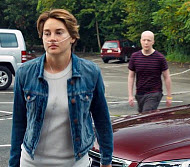The Fault in Our Stars
 for thematic elements, some sexuality and brief strong language.
for thematic elements, some sexuality and brief strong language.
Reviewed by: Kari Rothstein—first time reviewer
CONTRIBUTOR
| Moral Rating: | Offensive |
| Moviemaking Quality: |
|
| Primary Audience: | Teens Adults |
| Genre: | Romance Drama |
| Length: | 2 hr. 5 min. |
| Year of Release: | 2014 |
| USA Release: |
June 6, 2014 (wide—3,000+ theaters) DVD: September 16, 2014 |












CANCER—Where did it come from? Answer
How did bad things come about? Answer
Why does God allow innocent people to suffer? Answer
What about the issue of suffering? Doesn’t this prove that there is no God and that we are on our own? Answer
Does God feel our pain? Answer
What kind of world would you create? Answer
How can we help teens and children with cancer?
compare an optimistic versus fatalistic view of life
Augustus says he he intends to lead an extraordinary life.
Hazel says she feels like hand-grenade that's going to blow at some point and hurt everyone.
DEPRESSION—Are there biblical examples of depression and how to deal with it? Answer
What should a Christian do if overwhelmed with depression? Answer
In the movie, it is suggested that one should think about all the beauty around us and be happy about that. This is true, but if that’s all you have, it misses the big picture and falls sadly and tragically short of the potential and opportunities provided by God for each soul. Discuss why?
What’s dangerously wrong with Hazel’s view that oblivion follows death?
eternal life versus eternal death
Is there an actual place called “Hell”? Answer
Why was Hell made? Answer
Is there anyone in Hell today? Answer
What should you be willing to do to stay out of Hell? Answer
What if I don’t believe in Hell? Answer
THE GOOD NEWS—How to be saved from Hell. Answer
PURITY—Should I save sex for marriage? Answer


Teens! Have questions? Find answers in our popular TeenQs section. Get answers to your questions about life, dating and much more.

Learn how to make your love the best it can be. Discover biblical answers to questions about sex, marriage, sexual addictions, and more.
| Featuring |
|---|
|
Shailene Woodley … Hazel Grace Lancaster Ansel Elgort … Augustus Waters Nat Wolff … Isaac Willem Dafoe … Peter Van Houten Laura Dern … Mrs. Lancaster Lotte Verbeek … Lidewij Vliegenthart Sam Trammell … Mr. Lancaster Emily Peachey … Monica Mike Birbiglia … Patrick See all » |
| Director |
|
Josh Boone |
| Producer |
|
Marty Bowen Wyck Godfrey Temple Hill Entertainment |
| Distributor |
| Fox 2000 Pictures |
Life in all of its majesty and misery is the most exquisite pageant that humans bear witness to. Every human will enter into this world a vulnerable baby who must learn to adapt and survive all manner of situations. Humans will also have to face death and reconcile the meaning of their life. Along the way, some will achieve glory and fame, while many others will struggle with all manner of pain. It’s no surprise that “The Fault in Our Stars” examines some of the most pressing issues that weigh on the human psyche: pain, how you develop or find your life’s philosophy, and facing what comes after death.
What kind of world would you create? Answer
John Green’s moving story of a young cancer patient Hazel Grace Lancaster (Shailene Woodley) is based on Green’s experiences as a chaplain dealing with sick children. He wanted to express how beautifully and fully human that sick children are. Hazel, a thyroid cancer patient whose cancer has spread to her lungs, must deal not only with normal teenage feelings, but also with being terribly ill. Her parents force her to attend a cancer patient support group for teens where she one day encounters someone who will change here life: Augustus Waters. Augustus, a young amputee and fellow cancer patient challenges Hazel and the journey of their love becomes the stuff of legends.
The movie mentions many times a line from one of Hazel’s favorite books that says, “pain demands to be felt.” Pain does demand to be felt. Children and adults every day deal with the pain, indignity and uncertainty of cancer. Jesus showed much compassion to the infirm in his Earthly ministry, and it’s important to remember that pain does demand to be felt. Other people suffer pain from other illnesses or loss or worry. Yes, pain demands to be felt. You cannot get well unless you deal with a problem, but how do we deal with pain?
In “The Fault in Our Stars” we see characters deal with pain through evasion, distraction and even alcoholism. Some of the greatest comfort comes when Hazel is inspired by Anne Frank’s observations that beauty is all around and finding happiness in that. Augustus seeks to deal with life by hoping that he will lead an extraordinary life. Developing your life’s philosophy is an important part of each person’s journey.
It’s perhaps most regrettable that one of the few Christians depicted in the movie does little other than say, “Jesus is your friend” and lead a dysfunctional, anemic support group. People are looking for love and for hope, what better place to find that love than in Jesus Christ?
The characters in this movie are all facing issues with death, either their own or that of a loved one. The saddest part of this story is that none of the characters profess to trusting in Jesus. Death can be frightening, but thanks to the precious blood of Jesus, it need not be feared, for he has conquered sin and death (John 16:33).
It’s very difficult to watch characters on the brink of death or who need encouragement not be able to draw from the strength of Jesus. How much then should this film remind us that everyone around us who does not proclaim Jesus as Lord of their life is in danger of eternal separation from the one who can grant them infinite peace and ultimate healing. How much should it make us want to proclaim the Good News and reach out to people with genuine love and concern.
As for the content issues the movie is populated with a bit of bad language (20+ misuses of God’s name, 1 use of “f” word, “s” words (7) and S.O.B. (1), for example.
For sexual content we see couples kissing and groping each other. A woman is seen only in a towel. One couple engages in sex with much kissing and touching, although only her bare back and side of breast are seen. The couple is also later seen strategically covered by sheets, with her bare back visible.
The film does feature some mild violence while a character experiences a breakup and smashes items and later eggs a car.
On several occasions characters, even those underage, drink alcohol. Augustus also uses cigarettes as a “metaphor” is frequently seen carrying them in his hand or mouth.
Some viewers might be disturbed by the amount of medical trauma that plays out on screen. It could be difficult to watch characters going through procedures and struggling with the effects of drugs and illness.
Overall, this a movie about people living with cancer and facing their inevitable futures so illness, death, dying, eulogies and funerals all play a major role in most of the movie.
The title of the film is inspired by William Shakespeare’s play Julius Caesar. Mr. Shakespeare would certainly approve of both the quality of the movie, especially the acting. Shailene Woodley gives a performance full of grace, warmth and reserve. Ansel Elgort is charming and endearing as Augustus Waters. Laura Dern and Sam Trammell are supportive and almost ideal parents as Frannie and Michael, respectively. Willem Dafoe turns in a complex performance as Van Houten. The pace of the movie is quick and easy to follow. It’s beautifully shot and well appointed with an appropriately accompanying soundtrack.
While some will fear oblivion, Christians can take heart that those who follow Jesus know that we don’t face oblivion, rather we will find comfort and better things to come (1 Corinithians 2:9). The saddest part of “The Fault in Our Stars” therefore does not rest in the bad language or in the sexual content, but that we see characters that struggle whom we as Christians know we can offer hope. While some may be critical of the film’s depictions of Christians (i.e., clichéd guitar playing, guy who talks about being in the church as “being in the literal heart of Jesus”), it’s important to remember that those without the hope of and promise of better things to come we must show love. Songs and circle sharing time are fine, but what people are looking for is a real connection.
The biggest redeeming lesson to be taken from “The Fault in Our Stars” is remembering that there is good in the world, there is hope for the broken and Christians should feel duty-bound, nay honored to share that message of where goodness, love and hope truly come from.
Is the movie acceptable for young children? No. Does the movie have something to say to those of us who are entrenched in dealing with pain in our lives? Yes. Ultimately, it is a flawed movie with some moral issues, but it can be an inspiring challenge of how we live our comfortable lives and how we should reach out into a broken world and offer them the hope that we have.
Violence: Mild / Profanity: Heavy / Sex/Nudity: Moderate to heavy
See list of Relevant Issues—questions-and-answers.


I loved the healthy marriages of their parents, too. I was transported to Indianapolis, my hometown, for 2 wonderful hours. I came out of the theatre more in love with my husband of 28 years, so grateful for his love and the many years we have had together. I am walking in a new grace to love him better and appreciate him more, not knowing how much time we have left together, to reflect Christ and his Bride in a country where marriage is an endangered species, starting with the president!
Instead of weeping over the salvation of fictional characters, let’s see this film as a wake-up call to “love the one in front of us.” The author comes from a good family, and he and his brother have a huge Internet following of “Nerdfighters”: smart, young people that focus on doing good for their communities and having good, clean fun. My MK son is one of them.
Moral rating: Better than Average / Moviemaking quality: 5
I find myself wondering about the actual author of the book. My guess is that the author grew up in a very lame and dead church. The movie left me wanting to evangelize to the author. I pray for all the readers of this book to understand that although the author is talented, he is not using his talent for the Lord, and therefore his talent sadly will all be for nothing.
Seek true wisdom entertainment that will grow you as a Christian. Like the movie helps us to see though, our time may be cut short, therefore it is important that we tell others the truth about Christ and that we are here to make a choice for or against Christ.
I wish the support group leader would have told the group the truth about why we are here. This movie sadly left me feeling empty, because it lacked real truth about Christ.
Moral rating: Average / Moviemaking quality: 4½
Moral rating: Very Offensive / Moviemaking quality: 3
Also, there are several swear words used such as “f***head,” “s***” etc. I think that it would be wise to see this movie only if you are 14+.
Although it has morally questionable content, I still loved it as it is a beautiful story. This is a story that will relate to any age. I think it is quite unique and worth seeing. The soundtrack is excellent and Ansel Elgort and Shailene Woodley did an excellent job. The chemistry between them is believable, and it is well produced/directed. Only see this movie if you are sure about watching it.
I would recommend reading the book before watching the movie because that would help you make the decision. Also, if you watch it, make sure that you have a lot of tissues.
Moral rating: Average / Moviemaking quality: 4
Moral rating: Offensive / Moviemaking quality: 4
PLEASE share your observations and insights to be posted here.

Overall, though, it’s got some great lessons in it; I would watch again tomorrow! My husband liked it so much, he had seen half of it on his own and stopped it so we could watch it together.
My Ratings: Moral rating: Better than Average / Moviemaking quality: 5